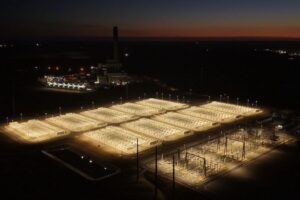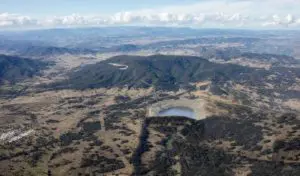Prime minister Malcolm Turnbull has again declared his support for all things fossil fuel, after suggesting his government could use public money to sponsor both new coal and gas production facilities in Australia, via the Northern Australia Infrastructure Fund.
In his latest concession to the nation’s powerful fossil fuel lobby, Turnbull told Brisbane Radio that the fund could be used both to subsidise gas pipelines in northern Australia and to underwrite the plans of Indian coal giant Adani to build a rail line from its proposed Carmichael mine.
Turnbull was speaking with ABC Brisbane on Thursday on the subject of his government’s plans to restrict the export of natural gas, in recognition that the massive and poorly regulated expansion of this market has had the effect of pushing up power prices in Australia.
But before Australian gas majors even had time to wince, Turnbull added that the Coalition was also considering backing the construction of a Northern Territory gas pipeline, and several pipelines in Queensland, to ease gas shortages, and lower prices.
“We are looking at a number of proposals, including one to bring gas from the Northern Territory into the east coast system, but more gas pipeline infrastructure in Queensland would be very welcome,” he said.
And when asked if Naif support for gas pipelines would rule out using the fund for a $900m concessional loan to Adani, Turnbull replied there was “no reason you can’t do all of the above”.
“This type of pipeline infrastructure is critically important,” he said. “So if the Queensland government or anyone else has got a proposal for pipeline infrastructure in northern Australia, then they should be getting their plans into the infrastructure fund as soon as they can.”
The comments come as the Murdoch media resumes its campaign to blame renewable energy, and not gas, for the nation’s rising electricity prices.
On Wednesday, Sydney’s Daily Telegraph reported that NSW households would be “whacked with power bill increases of up to $400 a year … driven by the shift from coal to renewable energy.”
There was no mention of gas in the article, despite the fact that it is now well accepted, even by the people who run the grid, that the state of Australia’s run-away gas market is the main culprit behind inflated power prices.
Likewise, Turnbull doesn’t seem to have got the memo, which is particularly confounding considering the findings of last week’s Climate Council report, which concluded that putting more gas into the electricity market would not lower electricity prices, but further sting consumers.
As the Climate Council report explained it, Australia’s LNG exports are pushing up the price of gas power at the expense of Australian households and business because domestic gas prices are now inextricably linked to world market prices for oil – a link is says will continue for the foreseeable future.
Climate Councillor and former President of BP Australasia Greg Bourne said the report’s clear message was, to leave the majority of Australia’s gas reserves in the ground.
“Don’t believe the hype. Any perceived climate benefits for gas are short-term and potentially cancelled out with methane emissions created from gas production and its supply chain.
“Gas prices have been rising and all the evidence shows they will keep rising,” he said. “In contrast our report shows that renewable energy is now cost competitive with gas.”
The report also noted that, like the massive Carmichael coal mine, any new gas market infrastructure brought with it “substantial” stranded asset risks.
“The point is – we can do the job of reaching zero emissions power well before 2050 without gas,” said Climate Councillor and energy sector veteran Andrew Stock, who oversaw development of the last three large gas power stations built on the east coast.
“(And we can) do it even cheaper with renewables.”
The federal opposition, meanwhile, has seized the opportunity to attack Turnbull’s energy policy inconsistencies, describing his baseless claims about increased supply lowering gas prices as “his most farcical fizzer yet.”
At 8:37AM he promised listeners on Brisbane radio:
TURNBULL: Oh, no, it will be cheaper than the prices that are being offered now. People are being offered prices of $20 a gigajoule. It should be around half that or less.
By 11:32AM, less than three hours later, that promise was gone:
TURNBULL: This is not saying that all gas prices will be halved as a result of these changes.
“Today’s performance shows (Turnbull) is incompetent, dishonest and out of touch,” said climate and energy spokesman Mark Bulter on Thursday.
“The more we learn about the government’s gas plan, the weaker it gets.”
Activist group GetUp said Turnbull’s plan to use public monies to underwrite gas pipelines was “another white elephant”.
“Not content with handing over a billion dollars to prop up Adani’s doomed coal project, Turnbull now wants to spend public money on an expensive and unviable gas pipeline as well.” said GetUp’s Miriam Lyons.
“Spending public money on white elephants in waiting is a betrayal of everyday Australians who pay their taxes to fund public services and public-interest infrastructure.
“As with Adani’s doomed Carmichael project, a gas pipeline from the Northern Territory to Queensland doesn’t stack up economically,” Lyons said.
“It will also do nothing to stop price-gouging by greedy gas generators who have a stranglehold on the market for supplying power to meet demand spikes caused by heatwaves and cold snaps.
“The best thing we can do to break the power of greedy gas companies is to back the competition: cleaner, cheaper, fracking-free energy from solar and storage, as well as energy efficiency,” she said.








